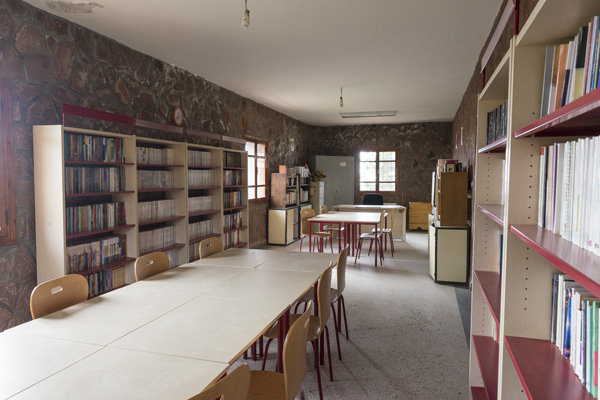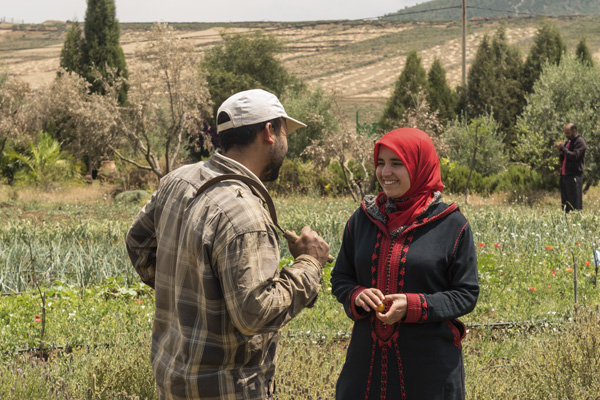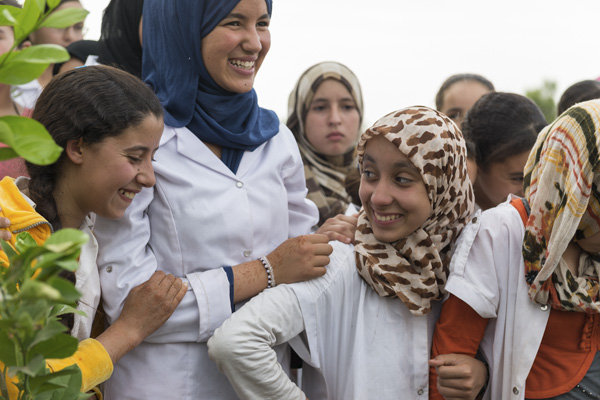By Hasnaa Benlafkih | Project Leader
September has been a busy month at Dar Taliba, with staff returning to the boarding house and diligently preparing for the upcoming academic year. Now in its 16th year, Dar Taliba is a well established institution in the Ourika Valley with applicants surpassing the number of spots available. It has decidedly come a long way from its humble beginnings when only a few pioneer families entrusted the nonprofit with their daughters’ wellbeing and education. Last year, 36 girls staying at Dar Taliba graduated junior high school thanks to the boarding house’s support.
This year, the all-girls boarding school received 65 new applicants but can only accommodate half of them in addition to the returning students. This leaves the selection committee, comprised of members of the Association de Bienfaisance et de Développement du Bassin De l’Ourika (ABDBDO), the nonprofit co-sponsoring Dar Taliba, with difficult decisions to be made. As in previous years, priority is given to girls from the more remote villages of the Ourika valley where there are no education opportunities beyond primary school available within walking distance and public transport is scarce and usually beyond the families’ means. Under such circumstances, girls as young as 12 are left with no choice but to drop out of school. Driving along the roads in the area, it is very common to see young school boys standing on the sides of the roads hitchhiking their way back and forth to school; an option much less available to girls.
Before the students arrive, we took a moment to learn more about the staff and other organizations supporting the boarding house and the remarkable service it provides to the Ourika valley. Throughout the last two weeks of September, returning students and parents dropped by to register or apply for room and board at Dar Taliba where Jamila Boussata, the alumna from Dar Taliba’s first cohort who is now Director at the boarding house, holds office hours to answer questions and enroll the girls. She tells me with a smile on her face that ‘’This year Club des Clubs de Casablanca (CCC), [an association introduced to Dar Taliba through a local from the Ourika valley who works with them leading excursions in the High Atlas], has agreed to increase its support, sponsoring ten additional girls’ attendance of Dar Taliba and bringing the number up to 45 girls.’’ Despite efforts to keep costs as low as possible, room and board at the all-girls establishment comes with a 650 dhs annual fee (equivalent to $67) which is beyond the means of the area’s most underprivileged families.
So, 112 girls will be arriving at Dar Taliba on 5 October when Jamila will assign them to the 14 rooms in groups of 8. They will be introduced to the house rules, including an 8pm curfew. Saida Marzoug, who has been supervising the girls at Dar Taliba since 2011, and Aicha Outghould, head cook at Dar Taliba since it opened its doors in 1999, will work with the girls on a clean-up and cooking schedule. With only 4 permanent staff members, the boarding school depends on contributions from the girls, who make their beds every morning and do their dishes to help the house run smoothly.
In addition to the co-ed middle school neighboring Dar Taliba where the girls presently study, a high school is currently being built within walking distance and will open its doors to students next year. This will vastly improve the local youth’s educational opportunities, eliminating the need for many of them to move or commute to the nearest high school at present, 20km away in the town of Tahanout.
The staff shared that Dar Taliba and its gardens have become a space for a variety of uses, including hosting local school camps. One camp saw students staying on the grounds this summer for two weeks in August. Abdelmalek Ait Mojaaddark, gardener at Dar Taliba since it first opened, told me they, too, had made a contribution to the garden. He pointed to two young olive trees the schoolchildren planted with him during a gardening workshop he led during their stay. Dar Taliba is also open two mornings a week to two groups of 15 preschoolers, whom we hope can also enjoy and learn from the garden.
On a less positive note, Abdelmalek said that as of this summer, Dar Taliba no longer benefits from the free water that was once donated by the commune, cutting water to the grounds by half and putting the garden under particular stress during dry seasons. Though the garden is designed to be highly drought-tolerant, GDF plans to dedicate a portion of the donations to this project to restore part of that water flow to the garden, especially during peak dry spells. With new garden users on the way, we are excited to continue growing our relationship with Dar Taliba.
Project reports on GlobalGiving are posted directly to globalgiving.org by Project Leaders as they are completed, generally every 3-4 months. To protect the integrity of these documents, GlobalGiving does not alter them; therefore you may find some language or formatting issues.
If you donate to this project or have donated to this project, you can receive an email when this project posts a report. You can also subscribe for reports without donating.
Support this important cause by creating a personalized fundraising page.
Start a Fundraiser

